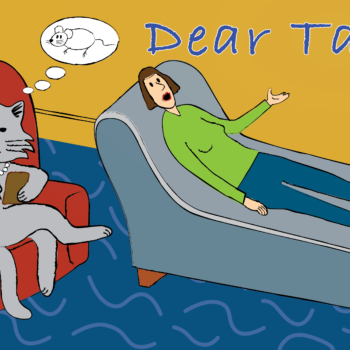Dear Tabby,
Hi. We are a cat loving family & we believe our 12 year old orange tabby, Mr. Sparkles, has dementia.
He has kidney issues, arthritis & our vet thinks he could have dementia too.
He howls every night & sometimes during the day. He seems disoriented sometimes & does things we’ve never seen him do.
I think he’s also grieving the loss of our beautiful kitty, Finn, who recently passed away 😭
We are addressing the kidney/arthritis issues with meds but how do you deal with a kitty who seems lost?
Thanks,
Mr. Sparkles and Family
Dear Mr. Sparkles and Family,
Watching our loved ones cope with grief and declining health is difficult. Even though cats and humans can experience many of the same health challenges and emotions, the resources and systems available for helping cats usually pale in comparison to those available for humans. This is especially true for mental health issues like dementia.
Underlying conditions such as kidney disease can exacerbate symptoms of dementia. We are glad that Mr. Sparkles is receiving care to address kidney disease and arthritis. Presumably this includes dialysis with subcutaneous fluids so the load on Mr. Sparkles’ kidneys is lessened, and perhaps a specialized kidney diet. If Mr. Sparkles has increased circulating phosphate levels due to kidney disease, please consider speaking with Mr. Sparkles’ veterinarian about starting a chelator such as Phos-Bind. Elevated phosphates can impact everything from appetite to mood to mental acuity. Just by addressing these underlying conditions, you might see improvements in Mr. Sparkles’ behavior and comfort.
While increased vocalizations especially at night can signal dementia, there are other causes as well. Decreased sensory input due to loss of vision or hearing can make pets feel lost and cause increased vocalization especially at night. Loss of a family member such as a companion cat can also cause increased vocalizations for the reason you said, Mr. Sparkles might feel lost without his companion. One approach for helping Mr. Sparkles feel better is to help Mr. Sparkles feel more engaged and accompanied, including at night. There are several approaches to try. One approach that we have seen help many cats is providing a stuffed animal as a companion for Mr. Sparkles to spend time with and cuddle up to at night.
There are plushies that resemble real life cats. Pairing a plushie with a heating pad can go a long way toward providing Mr. Sparkles with that sense of companionship that he misses. Leaving lights on and/or playing “cat TV” can help Mr. Sparkles feel less alone at night too. Playing relaxing music or ambient sounds at night for Mr. Sparkles can also help. If Mr. Sparkles is food motivated, setting an auto-feeder to provide Mr. Sparkles with food at night could keep Mr. Sparkles more engaged and less anxious. The idea is to keep Mr. Sparkles occupied during those times when he feels the most lost or alone. If Mr. Sparkles enjoys catnip, you can even set an auto-feeder to provide catnip during the night.
As with people experiencing dementia, cognitive tasks can slow the progression of dementia. For instance, if Mr. Sparkles is food motivated, consider a treat ball or similar toy that requires Mr. Sparkles to figure out how to access the treats inside. If Mr. Sparkles likes new experiences, consider securely carrying Mr. Sparkles around the backyard for enrichment.
Dementia and the loss of a loved one can make cats feel anxious and depressed. As in humans, medication can help cats feel less anxious and depressed. Consider speaking with Mr. Sparkles’ veterinarian about managing Mr. Sparkles’ anxiety and depression with medication.
Over-the-counter Zylkene is a calming aid that you can add to Mr. Sparkles’ food 1x/day. Zylkene is derived from milk and given the underlying kidney disease, confirm with your veterinarian that it is okay to supplement the diet with Zylkene. Perhaps your veterinarian would have an alternative idea as well. Providing Mr. Sparkles with a Thundershirt or even a snug fitting sweater is well known to calm many cats. Prescription medications acquired through a veterinarian could also be helpful. One common medication used to decrease anxiety in cats is Gabapentin. Providing Gabapentin to Mr. Sparkles before you go to sleep might go a long way toward helping Mr. Sparkles relax at night. Fluoxetine is another common antianxiety medication prescribed to cats for depression and anxiety.
As always, hold Mr. Sparkles close and tell him you love him. We hope Mr. Sparkles finds his way to feeling more positive.
Meowly,
Tabby



